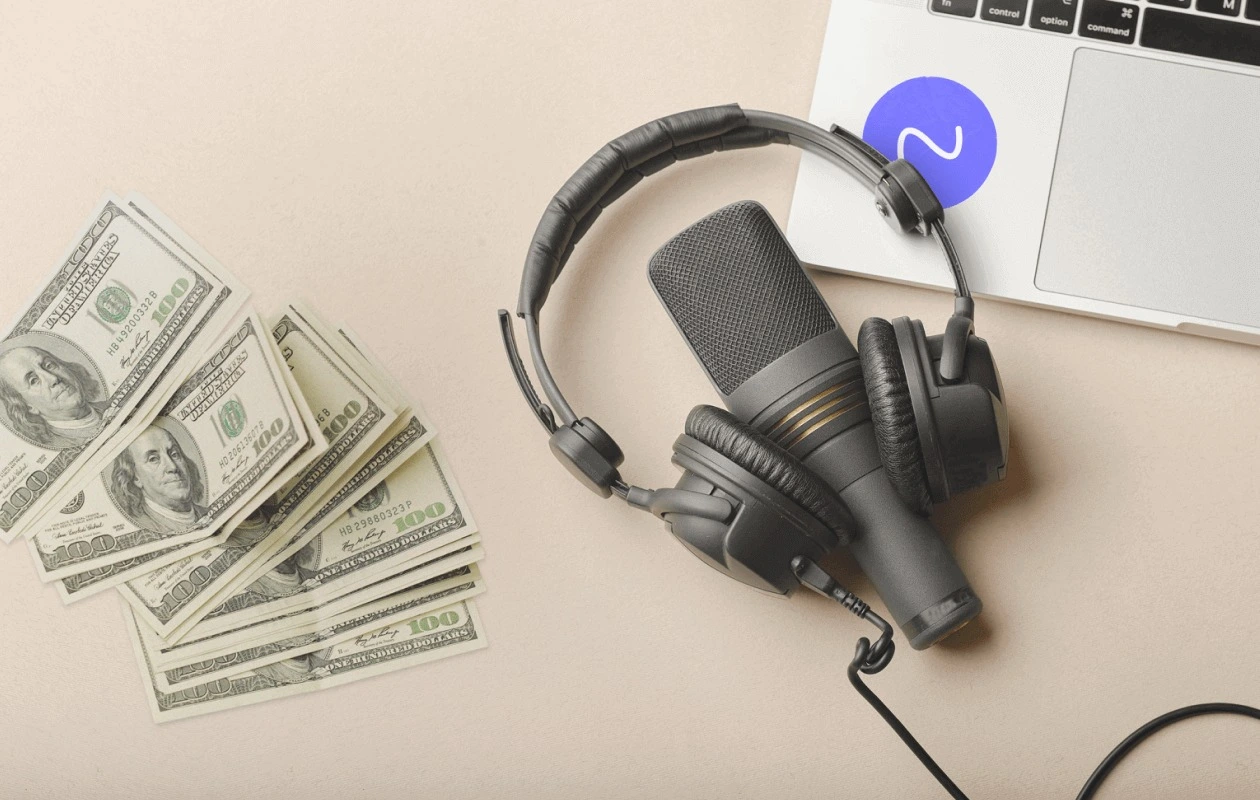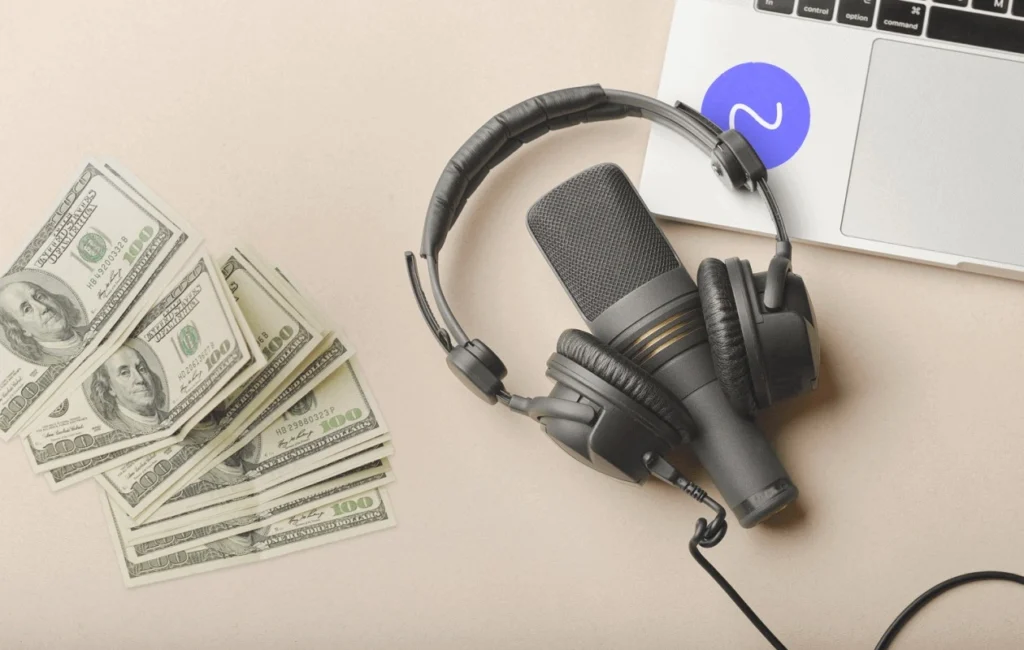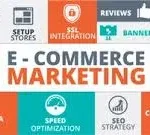
Podcast has exploded in popularity over the past few years, with millions of people tuning in to listen to their favorite shows on a daily basis. If you’re a podcaster or thinking about starting a podcast, you’ve probably wondered how you can turn your passion into a sustainable source of income. While it may take time to build a loyal audience, there are several effective strategies to monetize a podcast once you’ve established your presence.

In this comprehensive guide, we’ll explore the most popular ways to monetize your podcast, how to implement them, and tips to ensure success. Whether you’re a seasoned podcaster or just getting started, these strategies can help you turn your podcast into a profitable venture.
Why Monetize a Podcast?
Before diving into specific strategies, it’s important to understand why monetizing a podcast is worthwhile. Podcasting allows you to connect with your audience in a more intimate and engaging way compared to other content platforms. This unique connection can translate into a loyal following, making it an attractive option for brands, advertisers, and other revenue-generating opportunities.
Additionally, podcasting offers long-term earning potential. Once you’ve built an audience, you can leverage different monetization methods to create a steady income stream. Whether you’re a hobbyist looking to cover production costs or someone looking to make podcasting a full-time gig, monetization can help you achieve your goals.
1. Sponsorship and Advertising
Sponsorships and advertisements are one of the most popular ways to monetize a podcast. As your podcast grows in listenership, companies may want to pay for ad slots on your episodes to reach your audience. These ads can be tailored to fit your show’s format and target demographic.
- How Sponsorships Work: Sponsors typically pay for a pre-roll, mid-roll, or post-roll ad, which you’ll read or play during your episode. Pre-roll ads are placed at the beginning, mid-roll ads in the middle, and post-roll ads at the end of your episode. The more listeners you have, the more you can charge for these ad slots.
- Finding Sponsors: Podcasters with a large and engaged audience can attract sponsors directly, or they can join podcast ad networks such as Midroll, Podcorn, or AdvertiseCast. These platforms help connect podcasters with advertisers, making it easier to secure deals.
- How to Set Pricing: Podcast sponsorships are typically priced based on CPM (cost per mille), which means cost per 1,000 downloads. Depending on your niche and the engagement of your audience, CPM rates can range from $15 to $50 or more for mid-roll ads.
Tips for Success:
- Start by reaching out to small businesses or brands in your niche that align with your audience’s interests.
- Be transparent with your listeners about sponsored content to maintain trust and credibility.
- Create dynamic and engaging ad reads that blend naturally with your podcast’s tone and style.
2. Listener Donations and Crowdfunding
Another effective way to monetize a podcast is by allowing your listeners to support you directly through donations or crowdfunding platforms like Patreon. Many listeners are willing to contribute to their favorite podcasts, especially when they feel connected to the host and content.
- How Donations Work: You can set up a donation system using platforms like PayPal, Buy Me a Coffee, or Patreon. Listeners can choose to support your podcast with a one-time donation or set up recurring monthly payments to help fund your production costs.
- Using Patreon for Recurring Revenue: Patreon allows podcasters to offer exclusive content, early access to episodes, or bonus materials to listeners who subscribe to different membership tiers. This can be a great way to build a dedicated community while earning recurring income.
Tips for Success:
- Be clear about how listener donations will support the podcast (e.g., improving production quality, hiring editors, creating more content).
- Offer exclusive perks or rewards for Patreon members to incentivize contributions (e.g., behind-the-scenes content, live Q&A sessions).
- Regularly acknowledge and thank your supporters during your episodes to show appreciation.
3. Affiliate Marketing
Affiliate marketing is another popular strategy for podcast monetization. It involves promoting products or services and earning a commission when your listeners make a purchase using your unique affiliate link.
- How Affiliate Marketing Works: Once you join an affiliate program (e.g., Amazon Associates, ShareASale, or CJ Affiliate), you’ll be given a unique link to share with your audience. When listeners click on your link and make a purchase, you’ll earn a percentage of the sale.
- Choosing Relevant Products: To maximize your affiliate marketing efforts, it’s important to promote products or services that are relevant to your audience and align with your podcast’s niche. For example, if your podcast focuses on fitness, you could promote workout gear, supplements, or fitness apps.
Tips for Success:
- Be transparent with your audience about your affiliate partnerships to maintain trust.
- Mention your affiliate links naturally in your episodes or include them in the show notes for easy access.
- Choose high-quality products or services that you genuinely believe in, so your recommendations feel authentic.
For more information on affiliate marketing and other podcast monetization strategies, check out this guide on how to monetize a podcast.
4. Sell Merchandise
Many successful podcasters create and sell merchandise to their audience as a way to generate income. Merchandise can include branded products such as t-shirts, mugs, stickers, or even custom items that resonate with your podcast’s theme.
- How to Sell Merchandise: Platforms like Teespring, Redbubble, and Merch by Amazon allow you to design and sell custom merchandise with minimal upfront investment. These print-on-demand services handle production, shipping, and customer service, making it a hassle-free way to earn money.
- Creating Branded Merchandise: Design merchandise that reflects your podcast’s brand, catchphrases, or popular segments. You can also involve your audience in the design process by hosting a poll or asking for suggestions on social media to create items they’d love to buy.
Tips for Success:
- Promote your merchandise on your podcast, website, and social media to increase sales.
- Offer limited-edition products or seasonal merchandise to create urgency and boost demand.
- Ensure your merchandise aligns with your podcast’s identity and appeals to your audience’s tastes.
5. Offer Premium Content or Membership Subscriptions
Another way to monetize a podcast is by offering premium content or exclusive membership subscriptions. This can include bonus episodes, ad-free episodes, or access to special content that isn’t available to the general public.
- How Premium Content Works: Platforms like Supercast, Patreon, or your own podcast hosting service can help you set up a premium content model. Listeners can subscribe to gain access to extra content in exchange for a monthly fee.
- Examples of Premium Content: You could offer early access to episodes, behind-the-scenes interviews, or bonus material such as extended discussions or expert interviews that aren’t included in regular episodes.
Tips for Success:
- Regularly update premium content to keep subscribers engaged and willing to continue paying.
- Promote your premium offerings in your free episodes to encourage listeners to upgrade.
- Set up multiple subscription tiers to cater to different budget levels, offering more exclusive perks for higher-tier members.
6. Host Live Shows and Events
As your podcast grows in popularity, you may have the opportunity to host live shows or events where fans can purchase tickets to attend. Live podcast events can be a great way to connect with your audience in person and monetize your content at the same time.
- How Live Shows Work: You can organize live recordings of your podcast, Q&A sessions, or panel discussions and charge admission. These events can take place at local venues, festivals, or even online through platforms like Zoom or Crowdcast.
- Selling Tickets and Merchandise: In addition to selling tickets for the event, you can also sell exclusive merchandise or offer VIP packages that include meet-and-greets with the podcast hosts.
Tips for Success:
- Promote your live events well in advance through your podcast, social media, and email newsletters.
- Collaborate with other podcasters or influencers to increase attendance and create a buzz.
- Record live events and offer them as premium content for those who couldn’t attend in person.
7. Offer Consulting or Coaching Services
If your podcast is centered around a specific niche, expertise, or industry, you can offer consulting or coaching services as a way to monetize your knowledge. Listeners who find value in your insights may be willing to pay for one-on-one advice or guidance.
- How to Offer Services: Promote your consulting or coaching services through your podcast, and create a website or booking system where clients can schedule sessions. This model works well for podcasts related to business, personal development, fitness, or education.
Tips for Success:
- Be transparent about your qualifications and the value you can offer to potential clients.
- Offer free consultations or introductory calls to build rapport with your audience before converting them into paying clients.
- Showcase success stories or testimonials from past clients to encourage new sign-ups.
Conclusion
Monetizing a podcast may seem daunting at first, but with the right strategies, it’s entirely achievable. By exploring different revenue streams such as sponsorships, listener donations, affiliate marketing, merchandise, premium content, live shows, and consulting, you can create a sustainable income from your podcasting efforts.
Remember, the key to successful podcast monetization is building a loyal and engaged audience. Consistently provide valuable, entertaining, or educational content to your listeners, and they’ll be more likely to support your podcast through these monetization methods.
To dive deeper into ways to monetize your podcast, check out this helpful guide on how to monetize a podcast.








